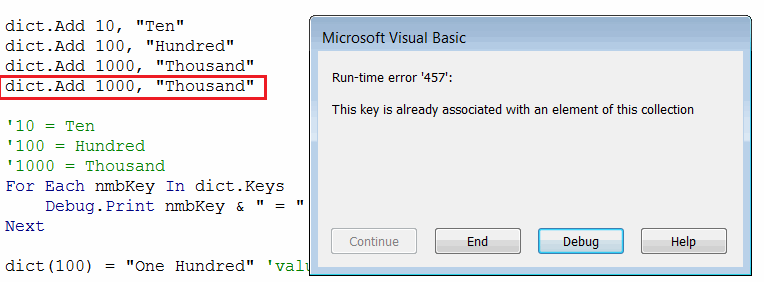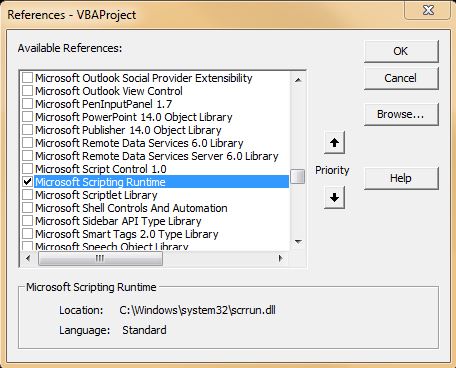Microsoft Scripting Runtime Dictionary
Nov 12, 2018 Scripting.Dictionary. A Dictionary object is the equivalent of a PERL associative array. Items, which can be any form of data, are stored in the array. Each item is associated with a unique key. The key is used to retrieve an individual item and is usually an integer or a. Create Instance of Dictionary with Excel VBA Code. After setting the reference to ‘Microsoft Scripting Runtime’ we need to create an instance of Excel VBA Dictionary. First, declare the variable as Scripting.Dictionary. Code: Sub DictExample1 Dim Dict As Scripting.Dictionary End Sub.
- Microsoft Scripting Runtime Dictionary Pdf
- Microsoft Scripting Runtime Dictionary Pdf
- Microsoft Scripting Library
- Microsoft Scripting Runtime Dictionary Windows 7
I do have a main Excel VBA Programm which calls a Sub Routine with late binding because using the Tools->References-> Microsoft Scripting Runtime is not feasable for the know reasons.
next step is to send the dictionary to my SubRoutine
will result in compiling error which is expected because I do not have the reference to the Microsoft Scripting Runtime.The Questions is now, how to solve that problem to declare the dictionary.By using
Would empty the dictionary.
1 Answer
Microsoft Scripting Runtime Dictionary Pdf
You are effectively asking how to use late binding instead of early binding (one article discussing this, more articles).
Instead of the following, which implies early binding (i.e. setting an explicit reference to the Microsoft Scripting Runtime library):


you need to declare your Sub's parameter as a generic Object type, as is required when using late binding (i.e. no explicit reference set, letting the program figure things out at runtime):
Think of Object as a container that can hold any kind of object — but once you put an object in it, e.g. a Dictionary, then that's what it becomes. In the Locals window it will appear as Object/Dictionary, meaning the container is Object (which is largely irrelevant to you, don't worry about this) but the nature/behaviour is Dictionary (which is what you want).
Addendum: This last sentence isn't quite as true as I thought it was. See explanation in follow-up question: Runtime Error with Dictionary when using late binding but not early binding
Not the answer you're looking for? Browse other questions tagged excelvbadictionary or ask your own question.
-->Object that stores data key/item pairs. Windows 10 store app installation folder.
Syntax
Scripting.Dictionary
Remarks
A Dictionary object is the equivalent of a PERL associative array. Items, which can be any form of data, are stored in the array. Each item is associated with a unique key. The key is used to retrieve an individual item and is usually an integer or a string, but can be anything except an array.
The following code illustrates how to create a Dictionary object.
Methods
| Method | Description |
|---|---|
| Add | Adds a new key/item pair to a Dictionary object. |
| Exists | Returns a Boolean value that indicates whether a specified key exists in the Dictionary object. |
| Items | Returns an array of all the items in a Dictionary object. |
| Keys | Returns an array of all the keys in a Dictionary object. |
| Remove | Removes one specified key/item pair from the Dictionary object. |
| RemoveAll | Removes all the key/item pairs in the Dictionary object. |
Properties
| Property | Description |
|---|---|
| CompareMode | Sets or returns the comparison mode for comparing keys in a Dictionary object. |
| Count | Returns the number of key/item pairs in a Dictionary object. |
| Item | Sets or returns the value of an item in a Dictionary object. |
| Key | Sets a new key value for an existing key value in a Dictionary object. |
Microsoft Scripting Runtime Dictionary Pdf
See also
Microsoft Scripting Library
Support and feedback
Microsoft Scripting Runtime Dictionary Windows 7
Have questions or feedback about Office VBA or this documentation? Please see Office VBA support and feedback for guidance about the ways you can receive support and provide feedback.



